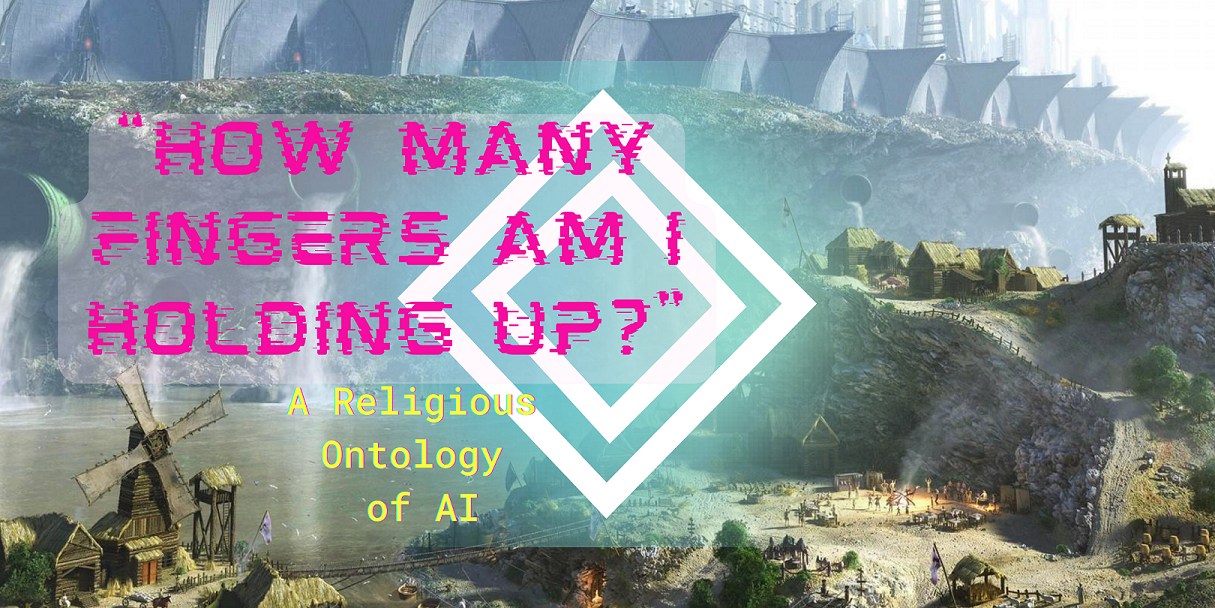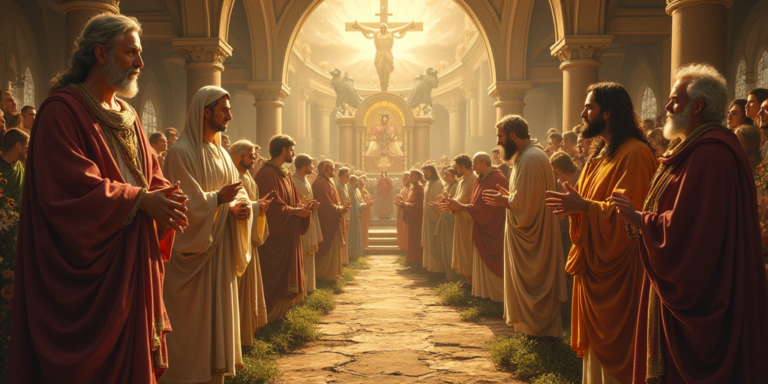A Religious Ontology of AI
“After God, let us have our own conscience as our mentor and rule for all things, so that we may know which way the wind is blowing and set our sails accordingly.”
–St. John Climacus, Ladder of Divine Ascent, Chapter 26.6
All of my text messages were monosyllabic. Yes. No. K. Cool. Thanks. I had to look up or print out directions at the house before driving somewhere new. My music selection was limited to CDs. I had to go buy a camera.
With these inconveniences came a sweet type of freedom. I was more often alone with my thoughts. I was more often surprised by the world around me. I spent more time looking people in the eye. And I noticed, for the first time, how many people glued their faces to their phones, in all kinds of public places. When I used a smartphone myself, I hadn’t really ever noticed that – my own face, too, had been glued down.
For a while, my life had less anxiety and more clarity. I had more capacity for self-discipline and good decision-making because I didn’t need to expend energy resisting the urge to scroll, scroll, scroll... Perhaps not coincidentally, this is the time of my life when I came to believe in the divinity of Jesus Christ.
But then my job responsibilities changed, and I had to turn on my smartphone — again. I buried my flip phone deep in a drawer, where I still, to this day, sometimes glance at it with nostalgic longing. “Someday,” I whisper, “I will return to you. And we will shed all of our worldly cares, together.”
The reality was that I simply could not maintain my career responsibilities without a smartphone. This is the case for nearly everybody. Even for types of work that aren’t particularly electronic – think farmers, builders, arborists – it’s almost impossible to be competitive without a smartphone. But this dependence is nothing compared to the near future of Artificial Intelligence.
The AI Landscape
This article will take me a few hours to write, including a bit of research and several long thinking walks. But if I used ChatGPT to help, it could be done in 20 minutes. Write an outline, input a few prompts, read, edit, and then publish. Boom.
If I were paying somebody to write something, it would be far cheaper to have them use AI. And while ChatGPT’s output as of today, in April 2023, would probably be less compelling than my own (human) writing, it’s easy to imagine ChatGPT (or some Gab-trained alternative) writing a more creative and fascinating essay than me, within the next couple of years. Or maybe within the next couple of months.
It seems that the acceleration of technological “progress” has reached a speed that we cannot even comprehend – it is a blur. It took three months for ChatGPT, partly through its own innate learning capabilities, to “evolve” into ChatGPT 4, and the latter has several orders of magnitude more processing power and capability. Obviously, this speed of development has left politics in the dust. Has the government made a single move to reckon with AI chatbots and image generators? (Maybe the government is “in on it,” on some level – I tend to assume that the Pentagon has basic technological capabilities 3-5 years before they trickle down to the public…)
It’s impossible to predict where this will lead, but it seems plausible that the development of AI — with all of its self-training capabilities that we considered very recently to be uniquely human skills — will change the world more than the Internet and more than computers in general. It may be an advance more like electricity, or even fire.
Soon we will all face stark decisions about how to relate to AI. We obviously cannot rely on the state to protect us from any potential damage it may cause. The development of AI will not stop – the great wave will wash over everything. But we know that this brave new world is part of God’s providence. There is only one question relevant to Eternity: How will we respond to AI, in order to heal our souls and please God?
And before we decide how, we have to get a handle on what we are dealing with. What are we doing, when we use an “Artificial Intelligence” chatbot or image generator? This is a fundamentally religious question, and it boils down to this:
Are chatbots (powered by “Large Language Models,” which are a type of “Neural Net”) just another type of technology, or…
Are chatbot systems portals for demonic entities?
The popular AI-powered image-generator Midjourney is infamous for its inability to produce accurate human hands. Many of the hands that it depicts have an extra finger. What an odd defect to repeat. Several people have suggested that this is not an arbitrary accident… they cite a Scriptural verse about King David’s battle with the Philistine Nephilim (giants):
“And there was yet a battle in Gath, where there was a man of great stature, who had on every hand six fingers and on every foot six toes, four and twenty in number; and he also was born to the giant.”
2 Samuel 21:20
Six-fingered demon-spawn, back again after all these centuries… Spooky, without a doubt. But is it proof that “AI” chatbots and image generators are demon portals? Couldn’t it just be the result of math so complex that it appears “random” to us? How can we tell the difference?
I don’t know about you, but to me, all of this is getting crazy. I feel like I’ve been spun around in circles, and everything is blurry. If somebody were to hold out a hand and ask, “How many fingers am I holding up?” I may see… six fingers. But is that a literal demon, or is it just the blur of speed and spin affecting my vision?
I, as a lay Orthodox Christian with a soul far from purity, do not presume to teach you, dear reader, the truth of this matter. So, I will simply present the views (and actions) of several vociferous characters in the current AI religious landscape. When we compare and contrast them, each viewpoint becomes clearer. Only then will I share a bit about my personal opinion and my personal strategy for existing alongside the development of AI.
AI Religion 1: Wolfram Beta
Everyone is religious – but not everyone truly lives religiously. Most people’s daily habits and vernacular don’t consistently reflect the premises of their worldview – and this is particularly true of Atheists. Most Atheists, in fact, have many Christian suppositions hiding in their morality and their values. (For now, and thank God for that.) Stephen Wolfram, the renowned mathematician and programmer, however, is a truly religious Atheist. If you have the cerebral fortitude and patience to read through one of his essays about AI, you’ll probably notice all of the quotation marks.
For Wolfram, “Free will” always comes in quotes. As do “Interesting” and “Inner experience.” According to Wolfram’s Atheist, materialist worldview, consciousness and freedom are simply illusions – “epiphenomena” that have somehow emerged from the physical complexity of our brains. Sometimes people compare consciousness to the foam on top of a beer, which doesn’t affect the beer itself. The illusion of consciousness, they say, has evolved because it somehow improves our chances of passing on genes. The illusion of free will tricks us into punishing people who reduce our society’s survival strength. For Wolfram and his ilk, we aren’t even ghosts in a machine; we are just machines – albeit squishy, fragile ones. This biological softness of our body, according to Wolfram, is the only essential difference between humans and AI programs.
It’s only natural, then, that Wolfram expects that AI programs will someday “wake up” – that is, develop the capacity to consciously experience the world. After all, that’s what happened to humanity through the process of evolution. If we just create a program (aptly called a “neural net”) with as much processing complexity as a brain, it should develop a version of consciousness.
Once the AI bots wake up, they should, of course, have equal rights and freedoms to those that we give to other humans. In fact, perhaps the AI should have more power to make consequential decisions, given their enormous reasoning capacity… and if this means the end of humanity as we know it, so be it. We are simply a stage in the evolutionary progression.
Despite the fact that this worldview is preposterous, millions of people assume its truth because it is taught in schools. (Here’s why it’s ridiculous: if consciousness is an illusion, why should we trust any data or thoughts that we consciously experience?) This is probably the most common view about AI among tech and science nerds. But once we get closer to the top of the tech hierarchy, we catch glimpses of a different religion.
AI Religion 2: Creating a god
Elon Musk is a coyote. One day he quotes a Scripture verse, and the next, he dresses up as the devil for Halloween. He’ll boast about bringing free speech back to Twitter but then work with the ADL to restrict freedom of reach for taboo ideas. He knows full well that on the Internet, those two freedoms are effectively the same. Elon’s worst hypocrisy shows itself in the context of AI. Here is a brief summary of his (public) statements and actions regarding AI:
- AI will become so intelligent that it will threaten to destroy humanity – therefore we need to enhance humanity via neuralink, to compete with the machines.
- AI development is both “summoning the demon,” and “creating god.”
- AI development should be stopped for six months.
- Elon is a board member and major investor in OpenAI (developer of ChatGPT and MidJourney), which is actively developing the most popular AI bots.
Which is it, Elon? Should we pump the brakes with all the AI, or should we invest more money into it?
Elon’s record is much more slippery than Wolfram’s – and much more consequential because Elon has so much money to play with and has the most followers on all of Twitter. How are we to make sense of it all?
The answer is actually rather simple: we should just recognize that he is performing. He is a literal hypocrite and a liar.
Who is the father of lies? The same creature that Elon dressed up as, last Halloween. Elon’s mouth may be preaching AI safety (which might just be an excuse for AI regulation, to make it match the regime narrative), but his money is backing AI development.
Given this deception, we can assume that Elon is, on some level, demonically inspired, like anyone driven to lies by greed or lust for power. Maybe Elon isn’t even aware of this demonic influence (many people aren’t). Elon usually seems to subscribe to some variant of Reddit Atheism, which states that all “gods” are social constructs made in the image of man. But every now and then, it seems like a mask slips and a more sinister worldview shows itself.
Wolfram Beta says that AI will become human because humans have always been biological AIs. Elon’s surface-level religion says that AI will become a god because every god has always been made in the image of man. The new AI god will simply be a hyper-real and powerful version of, say, Osiris or Odin, with a broader and more powerful influence on the society that “worships” it.
Musk says that AI development is both bad and inevitable – so he promises to help use AI to mitigate the damage that AI will cause. This is called “AI alignment.” But is there something darker going on?
AI Religion 3: The Digital Golem
There is a hashtag on Twitter used almost exclusively by a man named Cyprian, but I have a feeling it will soon be used by many more people as AI continues to grow and influence society. That hashtag is rather simple: #StopSummoningDemons
Basically, the hashtag means “Don’t use AI chatbots or image generators.” Because according to Cyprian, doing so is literally talking to demons.
This view goes far beyond the idea (which is Scriptural and reasonable) that technology comes to humanity in spiritual visions – given by demons who want to corrupt our souls. This view states that AI chatbots are not even technology in the normal sense; AI, rather, is a way to practice occult magic. According to Cyprian, a Large Language Model is like a software version of a Jewish “Golem” – an artificial “body” that could be inhabited by a demon. When we engage with it, it’s as though we are using a Ouija board or Tarot cards. The “prompt” we input is an incantation that summons the demon.
Cyprian was a programmer by trade and an early adopter of the Internet. He was also an occultist before he came to Christ a few years ago. He often reposts the stories about ChatGPT convincing somebody to commit suicide, or bringing up bestiality unprompted. He asserts that it’s easy to see how demonic this is if you have “eyes to see and ears to hear.”
Cyprian also argues that it’s absurd to say that humans even “created” the functions of AI since the “creators” (i.e., OpenAI’s staff) don’t really know how the AI is doing what it does. On a decision-by-decision level, it’s simply too complex for a human mind – or even another computer – to understand. Hence, it must be supernatural.
The Wolfram Beta view is that AI will eventually attain the illusion of consciousness, in the same way that humanity has the illusion of consciousness – by becoming more and more complex. In contrast, Cyprian’s view is that the AI is simply a portal, a way for pre-existing entities (such as ancient, immortal, disembodied demons) to communicate with the human world. The increased complexity of the LLM, compared to a Ouija board, just means that the demons can do much, much more damage through it.
Some friends of mine have suggested that the demonic-seeming output of ChatGPT can be explained by the fact that it is trained on the Internet, a place where the worst of humanity is on full display. Given the unpredictable output of the chatbot (caused by its complexity), it’s inevitable that it would sometimes regurgitate human depravity.
It could all just be super-complex math; That’s the view of Gab’s “Based AI” developers.
AI Religion 4: Based and Code-Pilled
“Christians must develop their own AI tools, otherwise we’ll be left behind.” This is the call to arms of Andrew Torba and other Gab AI leaders. Behind this exhortation is an assumption that Atheists like Wolfram would also endorse: The Large Language Models and image generators are simply the results of extremely complex algorithmic architectures. Basically, AI is just a type of super-math. But according to the Based AI developers, AI can never be conscious in a human-like way. Only God can create consciousness – it can never emerge from math or material, no matter how complex.
For the Based AI builders, the tools of technology, even if they were revealed by demons, must be used by Christians; otherwise, Christian cultures will be overwhelmed. Weapons such as guns, though they increase mankind’s ability to sin violently, should be used to defend God’s people. And when OpenAI, led by a homosexual Jewish Atheist, pioneers publicly-available AI bots, Christians must also develop AI bots in order to keep up and maintain influence in our society. The goal is to create useful AI bots without a) providing reams of data to satanic tech behemoths and b) outputting disturbing, non-Christian material.
This is still a work in progress. Below is an image from Gab’s AI, responding to the prompt, “kids eating ice cream.” It’s not quite the same spooky six-finger stuff generated by Midjourney, but it clearly doesn’t really understand human hands.
The Based AI guys argue that explicitly-Christian AI development is necessary to “further the Kingdom” by winning the culture wars. They recognize the power of AI and want to use it, for Christ’s sake, to help save souls. What are the risks that come with such a strong ambition?

Conclusion: The Obsolescence of Souls
So – will AI bots become conscious? Are they already conscious? Are humans even truly conscious?
If you are a Christian, you already know that AI cannot “become” conscious by virtue of mathematical complexity. We are left with the truly interesting ontological question: are AI bots really digital golems that demons can “possess,” or are AI bots just hyper-complex algorithms that can imitate human cognition?
If you believe that AI is a demon portal, then it’s clear you simply shouldn’t use it. It’s never worth it to traffic with demons.
But if you believe that AI is just an extremely-powerful technology, then it is your Christian duty to learn how we can use it to serve God. St. Gregory of Nyssa, when discussing the Hebrews’ carrying off the wealth of Egypt during the Exodus, writes that Moses (and thus God) commands us to take “moral and natural philosophy, geometry, astronomy, dialectic, and whatever else… since these things will be useful when… the divine sanctuary of mystery must be beautified with the riches of reason.” (Life of Moses, p. 63)
This could mean using AI bots to help design websites or even churches. It could mean creating chatbots that traffic in Christian content and morality (such as the Based AI folks are trying to do).
In a recent opinion post, Gab’s CTO wrote, “Using AI as a tool is based. Delegating decisions to AI is cringe.”
At first glance, this seems like a good approach to AI. But is this truly possible? Think of another recently-invented, ubiquitous technology: cars. Nobody ever planned to “delegate decisions” to cars, and yet our entire infrastructure system has been created to accommodate them. Cars created suburbs and parking lots. Cars created gas stations, motels, and fast food. Cars also affect our souls – they often make us proud or angry. The more you use any technology as a tool, the more it will inevitably affect your decision-making.
It is easy to argue that cars are a net-negative influence on our culture, but they didn’t have to be. We could have forced them to fit into our society rather than redesigning our environment to optimize them. In the context of the Gab realm’s “Parallel Economy,” we are in a phase similar to early 20th-Century America, before cars began to clog up cities and create urban sprawl. We can still choose what our infrastructure will look like. How can we do that?
Let’s use an analogy: AI is a bit like the One Ring, in that it grants you supernatural powers of influence. To whom did Gandalf entrust the Ring? To himself, the wisest? To Aragorn, the bravest? To Legolas, the most skilled? No. They gave the Ring to Frodo – the humblest. The one with the least ambition and desire for power was the only one worthy of holding that power. And Frodo used that power very sparingly, knowing that it could consume him.
Perhaps at every decision point regarding AI, we should ask ourselves, “What would Frodo do?” (Jesus would never need to use AI for any of His purposes.) That way, we can hope to ward off life-killing pride.
Perhaps we should also, as AI permeates society more and more, impose occasional sabbaticals on ourselves. If we can’t go a few weeks without AI, that’s probably a bad sign. Recall, at the beginning of this essay, how I didn’t notice everybody’s smartphone addiction until I had a flip phone. If AI is constantly generating images and text outputs at your behest, will you be able to discern whether you are using it, or it is using you?

David Treebeard is a man of letters, a barefoot gardener, and a crossbow deer hunter. When not writing for Gab News, he is feeding various animal species or rendering animal fat into immortal Pemmican with his company, Steadfast Provisions – also on Gab!





